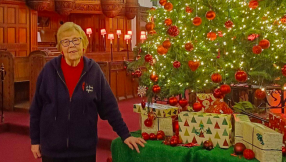"The truth is that God is very big! He is all-powerful and able to do all things." So says Wendy Mann who runs 'Training for Supernatural Ministry' (TSM) in her home church, The Kings Arms in Bedford. She firmly believes every Christian has the capacity to live a supernatural life in the way that Jesus modelled for us. Her book, Naturally Supernatural, describes her own journey of learning how to do it. I caught up with her to find out more.
When did you first discover what you describe in the book as 'what the normal Christian life could be like'?
I did an Alpha course when I was 19 where I saw someone healed for the first time in front of my eyes and I was given a prophetic word. These two experiences of God breaking in supernaturally through very normal people did something in my heart. I realised that if God wanted to break in supernaturally through them, He probably wanted to do the same through me. When I saw a friend healed of a bad knee soon after this, even though I felt lots of fear offering to pray, I felt so alive seeing God break in. I have been on a journey ever since of learning how to hear God's voice and push fear aside to speak to people and offer to pray for them when God opens up opportunities.
So God intends for us to live as Jesus did, seeing demonstrations of His kingdom wherever we go?
When Jesus started His earthly ministry He came declaring that the Kingdom of God was at hand, and He demonstrated God's Kingdom wherever He went. He took His disciples on the journey with Him and very quickly empowered them and sent them out to do the things that He had been doing. God's plan is that His Kingdom, which brings life and wholeness and healing, increasingly advances on the earth so that the kingdom of the enemy is pushed back and overthrown. His intention is that this will happen through the Church, which means anyone who has given their life to Christ. Jesus passed the baton to His disciples, who in turn have passed the baton on to us.
Time and time again students come to us not living this way, but leave seeing God's Kingdom break out in their everyday life. The life Jesus modelled really is available for every believer. It excites me to think of how much momentum the Kingdom would have if every believer really got hold of this truth.
Why do you think that generally we don't live like this?
Sometimes there is a lack of faith-filled teaching that helps to raise people's expectations that they can do the things that Jesus did. At other times people are living with unprocessed disappointment, which attacks their faith and their willingness to take risks.
I think many people discount themselves, assuming that this kind of lifestyle is possible for every other believer apart from them. At TSM we do a lot of teaching about our identity in Christ. The enemy loves to lie to us about our identity because he knows it immobilises us. Often as people realise who they really are, God's Kingdom starts to flow more readily through them.
At other times we don't pursue this lifestyle because it isn't comfortable. Many of us living in Western culture prioritise personal comfort above God's Kingdom. When push comes to shove we'd rather not respond to the Holy Spirit's promptings on the streets because it's often awkward and uncomfortable.
Having said all of the above I do think these barriers are beginning to shift in individuals and churches. That feels really exciting.
Why do you think disappointment is killing the Church and what can we do about it?
Sometimes people don't realise the disappointment is there. It's only when I talk about my own struggles with disappointment that their hidden pain comes to the surface. Other people know they are disappointed but they have never felt permission to really feel it, and so it gets stuck. Sadly, there can be an avoidance of emotion in the Church. People may never see the expression of emotion modelled by their leaders and some may even be taught that emotion is wrong; that we need to bypass our feelings in favour of taking hold of the truth in Scripture. Holding on to that truth is, of course, vitally important, but I have found that dealing well with my disappointment enables the truth in God's Word to go to a deeper place in my heart.
Disappointment is rife in the Church, but bit by bit God is exposing it and bringing freedom. I think two keys that can help us deal with disappointment in a healthy way are: to understand what the Bible teaches about emotion – that it's a gift from God and not to be feared or avoided – and to ensure people know that they have permission to feel and express their pain, without the fear of being misunderstood or rejected.
You talk about having 'an appetite for the impossible' – what do you mean?
The more I go on this journey, the more I realise how eager God is to break in and also how able He is. It is really easy for us to reduce God to fit into our limited understanding and experiences. When we do that, we quickly settle for less than is available to us. The truth is that God is very big! He is all-powerful and able to do all things. Breakthrough is not difficult for Him and nothing is impossible for Him. Having an appetite for the impossible for me means reminding myself who God is and what He loves to do and then letting that truth shape my prayers and expectation. It means stretching my faith by praying for things that I struggle to believe will change, and persevering in prayer when I don't immediately see what I'm asking God for. It's then only a matter of time before we see 'impossible' situations start to turn around because God breaks in.
You describe yourself as an introvert. How do you marry up the idea of stepping out and speaking to strangers on the street?
Every believer, whether an introvert or extrovert, has the incredible privilege of being commissioned by God to see His Kingdom come on the earth. The thing that has helped me most over the years is realising that the way I bring the Kingdom will look different to how others do it, and that is okay. Some of my friends are happy to approach anybody and everybody on the streets. This way of doing outreach gives them life. I prefer to take my time and see who God leads me to, and then approach people to initiate a conversation and see what God opens up.
How do you deal with times when you don't see breakthrough, particularly with healing?
There have been many occasions when I have prayed for people and seemingly nothing has happened (I say seemingly because the truth is that our prayers are powerful and effective; you never know what God is doing).
It has been really helpful to remember that ultimately it is God's responsibility to heal and save and transform lives. My responsibility is to love the person in front of me and be obedient to the promptings of the Holy Spirit. When my primary motivation is to love someone, they will get a glimpse of the kindness of God through me, irrespective of the outcome of my prayers.
Understanding the 'now' and 'not yet' of the Kingdom has also really helped. The reality is that God's Kingdom is here, it is forcefully advancing, but it won't be here in all its fullness until Jesus comes back. Knowing this can help us find peace in the fact that we don't see breakthrough every time we pray this side of heaven.
You believe love is the best motivation for seeing sustained supernatural breakthrough. Could you unpack this?
I used to speak to people about Jesus and offer to pray for them because I felt like I had to. It felt great on the occasions that God broke in, but, when it seemed like nothing happened, I would leave feeling discouraged – that I was failing as a Christian. Basically the outreach I did was about me trying to make myself feel better and earn favour with God. It quickly became tiring and a burden.
When my motivation switched to loving the person in front of me, I immediately felt a release from the pressure I was living under to try and make something happen. I realised that I could reveal God's love to someone just as much through encouraging them or buying them a coffee, as I could through praying for them or telling them about Jesus. As love has become my motivation, I have increasingly been able to see people and situations through God's eyes and develop a greater awareness of God's heart for breakthrough. Being motivated by love makes living like Jesus so much more fun and much more sustainable over the long haul.
As a church you have utilised 'treasure hunting' – could you explain and give some examples?
Treasure hunting has been such a helpful tool in our journey at King's Arms of learning to live naturally supernatural lives. It was particularly helpful for those of us riddled with fear, as we had a reason to approach people on the streets rather than just approaching them cold.
Essentially you create a 'treasure map,' asking God to give you clues of who you are to look for when you go onto the streets, under five different headings:
Location: Where to go to find the people God wants to lead you to.
Name: Could be the name of the person you meet or people they know.
Appearance: Any clues that could help you identify the people when you see them.
Ailment: Anything the people God leads you to might need prayer for.
Unusual: Any clue that doesn't fit into any of the other categories.
When you think you've found someone who fits some of the clues on your 'map', you approach them to explain what you're doing and see what God opens up.
How would you say you learned to push through the fear?
There are still many occasions when I give in to fear rather than pushing through it. I wonder if there will always be some fear to walk through, as it keeps you dependent on Jesus. Understanding God's measure of success has really helped me to keep taking risks and be okay with making mistakes. I used to measure my success by outcomes: Was the person healed? Did I get the word of knowledge right? Did the lady become a Christian? God has taught me over the years that His measure of success is totally different. God measures success by obedience and risk: Did I do what God asked me to do? The result of our obedience and risk is up to Him. Understanding this truth takes the pressure off and makes taking risks lots more fun.
If you're feeling provoked to walk through fear to share God's love with people on the streets, start by thanking God for the privilege of being part of His plan to extend His Kingdom. Then remind yourself that there is no pressure on you to make anything happen; your job is to love the person in front of you whatever that may look like. Then when you're next out and about, look for opportunities to love people and see what God opens up. Oh, and remember to have lots of fun on the journey.
















